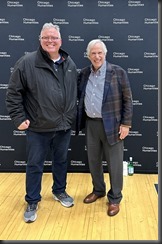 Henry Winkler came to the attention of the world (and to me) when he starred as Fonzie on the hit TV show "Happy Days." Fonzie was an iconic character - a man so cool he could start a jukebox by tapping it in the right place or snap his fingers to attract beautiful women or silence a crowd with a single word.
Henry Winkler came to the attention of the world (and to me) when he starred as Fonzie on the hit TV show "Happy Days." Fonzie was an iconic character - a man so cool he could start a jukebox by tapping it in the right place or snap his fingers to attract beautiful women or silence a crowd with a single word.
But that character was not Henry Winkler. By his own admission, Winkler grew up the opposite of cool. He wanted desperately to be accepted by the popular kids at school. He wanted the approval of his parents, but his undiagnosed dyslexia led to low grades, which led to his parents' disdain. His German parents called him "dummer Hund," which translates to "dumb dog."
"Being Henry: The Fonz... and Beyond" is an honest story about an actor's rise to success and his challenges along the way.
Growing up, Winkler lacked self-confidence in everything except acting. He was so enthusiastic about performing that he managed to qualify for Yale drama school despite his reading issues. In his audition, he improvised much of the Shakespearean dialogue he was supposed to deliver.
After struggling for a few years following graduation, he won the role of Fonzie. Audiences loved the lovable tough guy character so much that the producers restructured the show, shifting the focus from Ron Howard's Richie Cunningham to Winkler's Fonzie, which discouraged Ron Howard. Despite this, Howard and Winkler remained close friends, and Winkler had nothing but praise for Howard in his book.
"Happy Days" ran for eleven seasons, was a top-20 rated show for eight of those seasons, and spawned multiple spin-offs, including the successful "Laverne and Shirley" and "Mork and Mindy."
When the show ended, Winkler struggled to maintain his acting career without being stereotyped as a cool greaser. He worked steadily for decades before beginning an association with Adam Sandler and appearing in a handful of Sandler's successful comedies. The two met when Winkler called Sandler after hearing his name mentioned in Sandler's Saturday Night Live performance of "The Chanukah Song." The two remained friends afterward.
Winkler's career continued to climb when Bill Hader cast him as acting teacher Gene Cousineau in his dark comedy series "Barry." This role earned Henry his first Primetime Emmy Award.
Henry Winkler has experienced success, marginal success, and mega-success throughout his five decades of acting. But not everything came easy. His dyslexia hindered much of his career, and he found relationships difficult - in large part due to the lack of support and love from his parents. Years of therapy and a strong support group helped this.
I saw and met Henry on his recent book tour, where his "Barry" co-start D'Arcy Carden, interviewed him. D'Arcy had kind things to say about him, and Henry's smile and responses reinforced his reputation as one of Hollywood's good guys.
What impresses me about Henry Winkler's life is that he was able to be successful without being spoiled by the Hollywood lifestyle. By all accounts, he remains grounded and loyal to his friends. His kindness came across in his writing. "Being Henry" tells the actor's story with honesty, vulnerability, and gratitude. So many of his anecdotes are about people who helped him along the way. Every few chapters, his wife Stacey chimes in to relate a story of their life together in her own words.
Henry is in a good place now. He is approaching 80, his career is at its strongest since his Fonzie years, he has a good family and good friends, and he has learned to accept the things in his life that held him back. Watching "Happy Days" was a part of my life as a boy, and I am happy to see Mr. Winkler remain successful. He attributes his success to talent, work, and luck. We should all be so lucky.